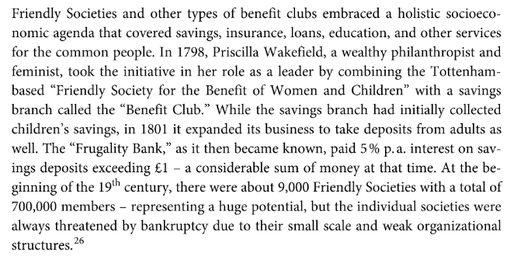Priscilla Wakefield, forgotten pioneer of financial services for the poor
The only true secret of assisting the poor is to make
them agents in bettering their own condition
them agents in bettering their own condition
|
The New Gresham Encyclopedia, 1922
Savings-banks are banks established for the receiving of small sums, so as to be taken advantage of by the poorer classes, and they are carried on entirely for the benefit of the depositors. They are of comparatively recent origin, one of the earliest having been an institution in which small sums were received, and interest allowed on them, established by Mrs. Priscilla Wakefield, at Tottenham, near London, in 1803. The first savings-bank in Scotland was formed in 1810 by the Rev. Henry Duncan, of Ruthwell, Dumfriesshire. In 1814 the Edinburgh savings-bank was established on the same principles, and the system soon spread over the kingdom. The first Act relating to savings-banks was passed in 1817.
|
Priscilla Wakefield, Mother of Microsavings
David Roodman David Roodman, whilst at the Center for Global Development, noted in his research into the pre-modern history of financial services for the masses:
I found many stories with modern resonance. Among my favorite is that of Priscilla Wakefield, the only heroine in the history. He noted that Priscilla Wakefield was probably influenced by the philosopher Jeremy Bentham, who she is known to have read. In 1797, Bentham had called for the creation of "frugality banks" to cultivate thrift among the poor, while criticizing the predominant institution to provide such services, the friendly society. Also that: the savings bank movement differed from today's microfinance in the motive the promoters usually avowed---cultivating frugality instead of microenterprise---and in the favored means---savings instead of credit. In fact, poor people have probably used savings and credit in similar ways. And that: if the dominant story about how poor people can and should use savings, credit, and other financial services has changed so much over time, that's a sign that we should doubt currently fashionable thinking. For more on the History of Mircrofinance The lessons of Mircrofinance History |
|
Priscilla Wakefield - as relevant today as 200 years ago
Perhaps the most striking similarity to today’s notions of microfinance comes from Priscilla Wakefield in 1801, founder of what is considered to be the first savings bank: “It is well known to those who are conversant with the affairs of the labouring classes, that it is much easier for them to spare a small sum at stated periods, than to lay down what is sufficient…at once.”
This was penned some 200 years before Stuart Rutherford enunciated the idea of usefully large lump sums, and how the difficulty of gathering them drives much of the informal financial markets serving the poor today. Apparently, current research into poor people’s financial needs is as much about rediscovering old truths as it is about finding new ones. The early promoters of savings banks had clearly hit upon something important. The movement spread rapidly – in some countries, the growth rate was aggressive even by the standards of today’s microfinance sector. Daniel Rozas, Rediscovering a Well-Trod Path to Financial Inclusion Microfinance Focus 7 June 2010 |
|
David Roodman ran the Open Book Blog which ran from 2009 until he left the Center for Global Development to go to the Gates Foundation in 2013. The importance of his blog is recorded here. On David's departure a new e-MFP blog was launched in which the discussions and debates on microfinance continue.
|
The book which David wrote using the Open Book blog is
Due Diligence: An Impertinent Inquiry into Microfinance David Roodman, Center for Global Development, Brookings Institution Press 2012
Due Diligence: An Impertinent Inquiry into Microfinance David Roodman, Center for Global Development, Brookings Institution Press 2012
Contact: [email protected]
|


